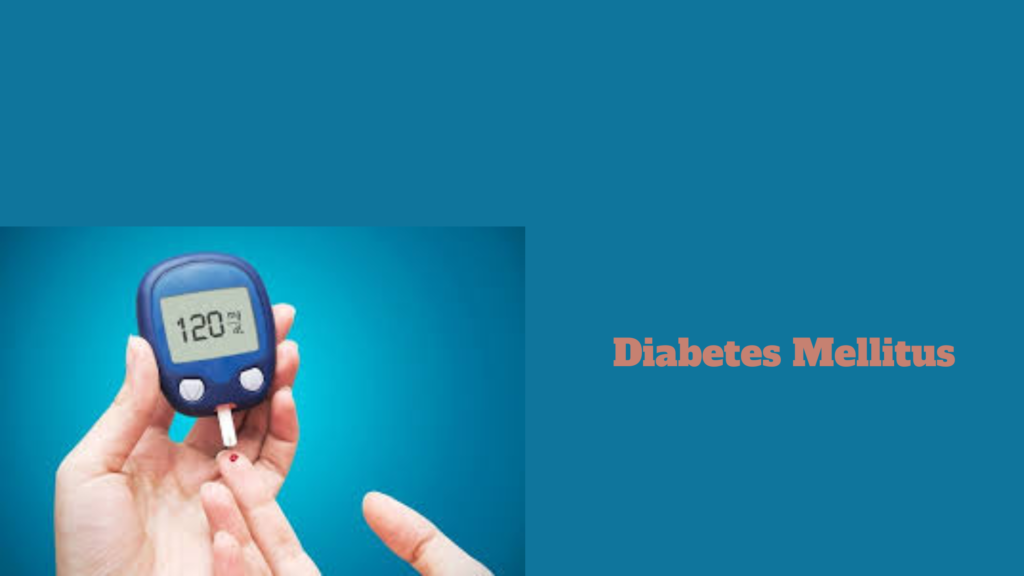
Diabetes Mellitus
Diabetes mellitus is a chronic metabolic disorder characterized by elevated blood glucose levels resulting from defects in insulin secretion, insulin action, or both. Effective management is crucial to prevent complications such as cardiovascular disease, neuropathy, nephropathy, and retinopathy.
🧬 Types of Diabetes Mellitus
- Type 1 Diabetes
- Cause: An autoimmune response destroys insulin-producing beta cells in the pancreas.
- Onset: Typically diagnosed in childhood or adolescence.
- Management: Requires lifelong insulin therapy.
- Prevention: Currently, there is no known prevention.(ada.com)
- Type 2 Diabetes
- Cause: Insulin resistance combined with an eventual pancreatic beta-cell dysfunction.
- Risk Factors: Obesity, physical inactivity, family history, and poor diet.
- Management: Lifestyle modifications (diet and exercise), oral medications, and possibly insulin.
- Prevention: Maintaining a healthy weight, regular physical activity, and a balanced diet can reduce risk.
- Gestational Diabetes
- Cause: Develops during pregnancy due to hormonal changes affecting insulin action.
- Management: Dietary modifications, physical activity, and monitoring blood glucose levels.
- Postpartum: Blood glucose levels typically return to normal after delivery; however, women who had gestational diabetes are at higher risk for developing type 2 diabetes later in life.(health.harvard.edu)
- Latent Autoimmune Diabetes in Adults (LADA)
- Cause: Shares characteristics with both type 1 and type 2 diabetes; involves autoimmune destruction of beta cells but progresses more slowly.
- Management: Initially may be managed with oral medications, but insulin therapy becomes necessary over time.(byjus.com)
- Maturity-Onset Diabetes of the Young (MODY)
- Cause: A rare, monogenic form of diabetes caused by mutations in a single gene.
- Onset: Typically before 25 years of age.
- Management: Varies depending on the specific genetic mutation; may involve lifestyle changes or specific medications.(verywellhealth.com)
- Type 3c Diabetes (Pancreatogenic Diabetes)
- Cause: Develops secondary to pancreatic diseases such as chronic pancreatitis or pancreatic cancer.
- Management: Focuses on managing both the underlying pancreatic condition and blood glucose levels.(en.wikipedia.org)
- Type 5 Diabetes
- Cause: Associated with malnutrition and typically affects young, slim individuals in low- and middle-income countries.
- Management: High-protein, low-carbohydrate diets with micronutrient supplementation have shown potential.(the-sun.com)
🩺 Symptoms
- Increased thirst and frequent urination
- Fatigue
- Blurred vision
- Slow-healing wounds
- Unexplained weight loss
- Tingling or numbness in hands or feet(ada.com)
🧪 Diagnosis
Diagnosis is confirmed through blood tests:
- Fasting Plasma Glucose (FPG): ≥126 mg/dL
- Oral Glucose Tolerance Test (OGTT): ≥200 mg/dL after 2 hours
- Random Blood Glucose Test: ≥200 mg/dL with symptoms
- Hemoglobin A1c: ≥6.5%(health.harvard.edu)
🩹 Management
- Lifestyle Modifications: Healthy eating, regular physical activity, and weight management.
- Medications: Oral hypoglycemics (e.g., metformin), insulin therapy, and other agents depending on the type of diabetes.
- Monitoring: Regular blood glucose monitoring to assess control.
- Education: Diabetes self-management education and support (DSMES) programs.(health.harvard.edu, verywellhealth.com)
🧭 Prevention
- Type 1 Diabetes: No known prevention.
- Type 2 Diabetes: Maintain a healthy weight, engage in regular physical activity, and consume a balanced diet.
- Gestational Diabetes: Maintain a healthy weight before and during pregnancy; regular prenatal care.
F
